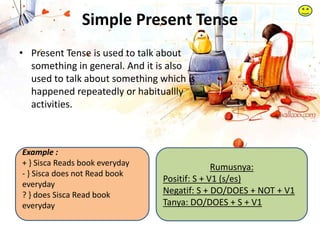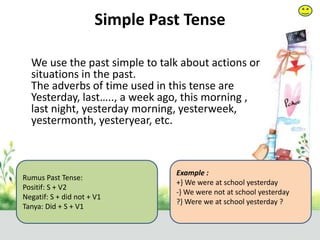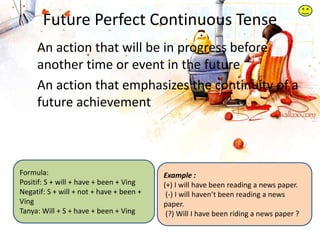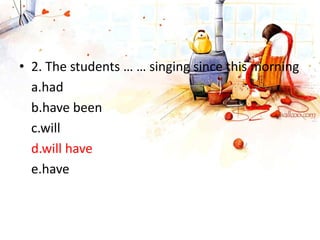Tenses
- 1. Name: Maulia Hasna Sabilla Nida Hidayatul F Group 15 ?
- 2. TENSES Simple Present Tense Simple Past Tense Present Continuous Tense Future Perfect Continuous Tense Simple Future Tense Past Perfect Continuous Tense Future Perfect Tense Past Perfect Tense Past Continuous Tense Future Continuous Tense Present Perfect Tense Present Perfect Continuous Tense
- 3. Simple Present Tense ? Present Tense is used to talk about something in general. And it is also used to talk about something which is happened repeatedly or habituallly activities. Rumusnya: Positif: S + V1 (s/es) Negatif: S + DO/DOES + NOT + V1 Tanya: DO/DOES + S + V1 Example : + } Sisca Reads book everyday - } Sisca does not Read book everyday ? } does Sisca Read book everyday
- 4. Simple Past Tense We use the past simple to talk about actions or situations in the past. The adverbs of time used in this tense are Yesterday, lastĪŁ.., a week ago, this morning , last night, yesterday morning, yesterweek, yestermonth, yesteryear, etc. Rumus Past Tense: Positif: S + V2 Negatif: S + did not + V1 Tanya: Did + S + V1 Example : +} We were at school yesterday -} We were not at school yesterday ?} Were we at school yesterday ?
- 5. Simple Future Tense Example : (+) President shall at Nederland the day after tomorrow. (-) President shall not at Nederland the day after tomorrow. (?) Shall President at Nederland the day after tomorrow? Rumus Future Tense Positif: S + will + V1 Negatif: S + will + not + V1 Tanya: Will + S + V1
- 6. Present Continuous Tense ? We use The Present Continuous Tense when we talk about something which is happening at the time of speaking ? We also use The Present Continuous Tense when we talk about something which is happening around the time of speaking, but not necessarily exactly at the time of speaking. We often use the Present Continuous when we talk about a period around the present. We use the present continuous when we talk about the changing situation. Example Sentence : (+) He is playing badminton now (-) He isnĪ»t playing badminton now. (?) Is he playing badminton now Rumusnya: Positif: S + Tobe + Ving Negatif: S + Tobe+ Not+ Ving Tanya: Tobe + S + Ving .
- 7. Past Continuous Tense ? We use past continuous Tense to say that someone was in the middle of doing something at a certain time. The action or situation had already started before this time but hadnĪ»t finished Rumus Past Continuous Tense Positif: S + was/were + Ving Negatif: S + was/were + NOT + Ving Tanya: Was/Were + S + Ving ? Example : ? (+) They were talking about sport when I met him. ? (-) They werenĪ»t talking about sport when I met him. ? (?) Were they talking about sport when I met him.
- 8. Future Continuous Tense Rumus Future Continuous Tense Positif: S + will + be + Ving Negatif: S + will not + be + Ving Tanya: Will + S + be + Ving ? Example : ? (+) I will be writing a comic. ? (-) I will not writing a comic. ? (?) Will I be writing a comic ? An activity that will be in progress at a time in the future
- 9. Present Perfect Tense ? We often use the present perfect Tense to give new information or to announce recent happening ? We can use the Present Perfect Tense with already to say that something has happened sooner than expected ? We can use the Present Perfect Tense with just (= a short time ago) ? We talk about a period of time that continuous up to the present, we use the present perfect. ? We often use ever and never with the present perfect ? We have to use present perfect Tense with This is the first timeĪŁ, It the first timeĪŁ ? We often use the present perfect with yet. Yet shows that the speaker is expecting something to happen. Use yet only in questions and negative sentences Example : (+) you have eaten mine. (-) she has not been to Rome. (?) have you finished? Formula : subject+auxiliary verb+main verb
- 10. Past Perfect Tense ? We use the Past perfect to say that something had already happened before this time Example : (+) When my brother arrived , I had painted my motor cycle (-) When my brother arrived , I hadnĪ»t painted my motor cycle (?) Had I my motor cycle , when my brother arrived ? Rumus Past Perfect Tense Positif: S + had + V3 Negatif: S + had + not + V3 Tanya: Had + S + V3
- 11. Future Perfect Tense ? An action that will be completed before another event or a certain time in the future Example : (+) You will have forgotten me by then. (-) We will not have left. (?) Will they have received it? Rumus Future Perfect Tense Positif: S + will + have + V3 Negatif: S + will + not + have + V3 Tanya: Will + S + have + V3
- 12. Past Perfect Continuous Tense A longer action that had happened and continued up to the time in the past and ended or stopped just before something else in the past An activity is in progress in the past ? Formula: ? Positif: S + had + been + Ving ? Negatif: S + had + not + been + Ving ? Tanya: Had + S + been + Ving Example : (+) When they washed my drees , your father had been playing badminton (-) When they washed my dress , your father hadnĪ»t been playing badminton (?) When they washed my dress , had your father been playing badminton ?
- 13. Future Perfect Continuous Tense An action that will be in progress before another time or event in the future An action that emphasizes the continuity of a future achievement Example : (+) I will have been reading a news paper. (-) I will havenĪ»t been reading a news paper. (?) Will I have been riding a news paper ? Formula: Positif: S + will + have + been + Ving Negatif: S + will + not + have + been + Ving Tanya: Will + S + have + been + Ving
- 14. Present Perfect Continuous Tense ? Is a sentence that shows the events that have been done and is still in progress at the current time. Example : (+) She has been going to Malang since evening. (-) She hasnĪ»t been going to Malang since evening. (?) Has she been going to Malang ? Rumus Present Perfect Continuous Tense Positif: S + have/has + been + Ving Negatif: S + have/has + not + been + Ving Tanya: Have/has + S + been + Ving
- 15. EXERCISE 1. John ĪŁ a crocodile in the river yesterday. a. see b. saw c. seen d. have see e.had saw
- 16. ? 2. The students ĪŁ ĪŁ singing since this morning a.had b.have been c.will d.will have e.have
- 17. 3.She has been .... For two hours a.talk b.talked c.was talk d.talking e.told
- 18. 4.When I had ... The book,i put it down a.finished b.been finished c.finish d.been finishing e.to finish
- 19. 5. At eleven o`clock Ani will have ...... For two hours a.write b.writed c.writing d.been writed e.been writing




















